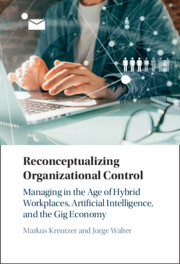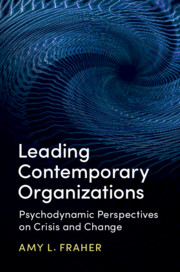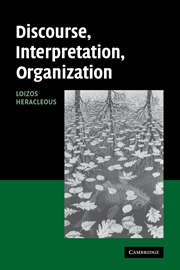Reconceptualizing Organizational Control
Organizational control addresses the fundamental yet vexing managerial problem of aligning workers' capabilities, activities, and performance with organizational goals and aspirations. In recent years, the onset of COVID-19, combined with new developments in information and communication technologies, has brought about profound changes in organizations, and even in the nature of work itself. We have seen surges in virtual and remote work; progression of alternative work arrangements (especially in the gig economy); and an increasingly wide-spread reliance on algorithmic monitoring and control. These changes have exacerbated the tension between the pursuit of individual and organizational interests, exposing the limits of traditional approaches to organizational control, and questioning whether they still reflect contemporary organizational realities. Providing a comprehensive discussion of the multi-disciplinary approaches to organizational control, this book integrates the new and evolving trends in technology, organizations, and society into a reconceptualization of organizational control for twenty-first-century organizations.
- Reports the results of comprehensive conceptual and empirical reviews of the multidisciplinary organizational control literature, including its underlying theories and assumptions, to present an overarching organizing framework of the dimensions, functions, outcomes, and key contingencies that comprise organizational control theory
- Illustrates how recent trends in the technological, demographic, socio-cultural, and organizational environments expose the limitations of traditional control practices and challenge key assumptions underlying organizational control theory
- Proposes a configurational approach, which develops new theory on how multiple controls combine in complementary-and sometimes contradictory-ways to jointly affect outcomes, often with multiple alternative paths to the same levels of outcomes
Reviews & endorsements
'Control is a fundamental in our increasingly complex world of organizations. Managers must make choices about how much to use formal and informal control mechanisms to foster focus, coordination, engagement, and a sense of community and trust. In this important book, which goes beyond standard approaches, Kreutzer and Walter integrate the extensive research on control and synthesize the key implications of that work. For those who wish to study control and those who wish to manage it, this volume is an indispensable reference and springboard for research and practice.' Sim B. Sitkin, Michael W. Krzyzewski University Distinguished Professor and Professor of Management and Public Policy, Duke University
'Although control research has a long and rich tradition, its foundations are ill-equipped to tackle organizational challenges of the present and future. Kreutzer and Walter are doing an excellent job of condensing its history and outlining its future trajectory towards modern organizational changes, such as ecosystems or the usage of artificial intelligence. Outstanding - if one wants to see how control research is evolving towards the future, you have to read this book.' Christoph Lechner, Chair of Strategic Management, University of St. Gallen
'At a time when exponential technological and societal changes have catapulted us into unknown territory, Kreutzer and Walter take a much-needed panorama of the organizational control research assessing its relevance while reconceptualizing it for the future.' Laura B. Cardinal, Endowed Chair and Director of the SmartState Center for Innovation and Commercialization, Darla Moore School of Business, University of South Carolina
'With many trends converging simultaneously, the nature of work in and around organizations is being upended before our eyes. Kreutzer and Walter have directly confronted this situation, and in so doing have created an important, comprehensive examination of organizational control that bridges the past, present, and future. Their contributions to scholarship and practice will be profound.' C. Chet Miller, C. T. Bauer Professor of Organizational Studies, University of Houston
Product details
November 2024Hardback
9781009282758
360 pages
235 × 159 × 25 mm
0.65kg
Available
Table of Contents
- Part I. (Re-)Introducing Organizational Control:
- 1. Introduction
- 2. What is organizational control?
- 3. A history of organizational control
- Part II. Current State Of Organizational Control:
- 4. An organizational control framework
- Part III. Quo Vadis Organizational Control?:
- 5. The future of work inside and outside organizations
- 6. Reconceptualizing organizational control
- 7. New directions for organizational control theory and practice.





